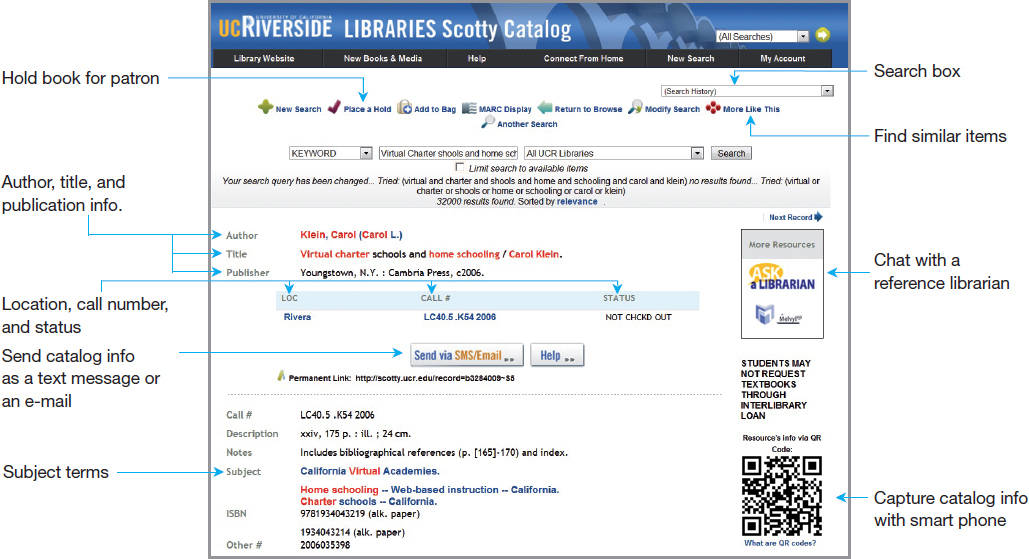Find books (and other sources) through your library’s catalog.
Books housed in academic library collections offer two distinct advantages to the student researcher:
- They provide in-depth coverage of topics.
- They are more likely to be published by reputable presses that strive for standards of accuracy and reliability.
To find books (as well as reference works and multimedia resources) on your topic, turn to your library’s catalog (see Figure 24.1). You can generally search the online catalog by author’s name, title, keyword, or subject heading, and narrow your search by using the catalog’s advanced search options.
Though you can search by keywords, most college libraries catalog sources use special subject headings devised by the Library of Congress (the national library of the United States). Finding and using the subject headings most relevant to your search will make your research more productive. You can locate the subject headings your library uses by pulling up the record of a relevant book you have already found and looking for the list of words under the heading “Subject” or “Subject headings” (Figure 24.1). Including these terms in your search may help you find additional relevant resources. Ask a librarian for help if you cannot identify the headings.

Some library catalogs allow you to search by call number, which makes it easy to find other items on the same or a similar topic. (You might think of a call-number search as the electronic equivalent of looking at books shelved nearby.) For example, typing LC40 (the first part of the call number from the library record shown in Figure 24.1) into the search box calls up the records of other items on the subject of home schooling:
| Title | Call number |
| Well-Trained Mind: A Guide to Classical Education at Home | LC40.B39 2004 |
| Love in a Time of Homeschooling: A Mother and Daughter’s Uncommon Year | LC40.B76 2010 |
| Homeschool: An American History | LC40.G34 2008 |
| Family Matters: Why Homeschooling Makes Sense | LC40.G88 1992 |
| Home Schooling: Parents as Educators | LC40.H65 1995 |
| How Children Learn at Home | LC40.T48 2007 |
If your search for books in your college library turns up little that is useful to you, do not give up. Consider using WorldCat (www.worldcat.org), which includes records for many libraries in the United States and worldwide. You may be able to request an item from another library via your library’s interlibrary loan service. Inquire at your library for services available to you that can connect you to resources in other libraries.
Though library catalogs are the place to go to find books, you can also use your library’s catalog to find
- Audio: recordings of music, speeches, plays, and readings
- Video: films and documentaries in a variety of formats
- Art: drawings, paintings, photographs, and engravings; some libraries may also own collections of artwork
Many libraries also house archives and special collections comprising manuscripts, rare books, and specialized materials or resources of local or worldwide interest. Where as some libraries may list these items in their online catalog, others may provide links to these special collections in a different location on their Web sites; still others may provide access only through a catalog in the archives or special-collections room. Ask a librarian whether such materials may be useful to you.